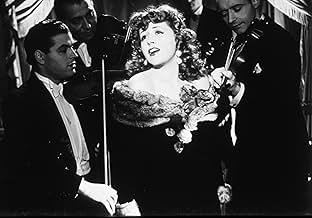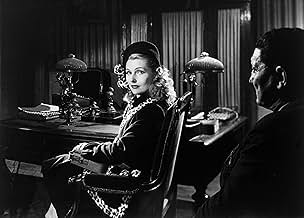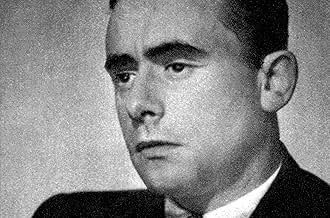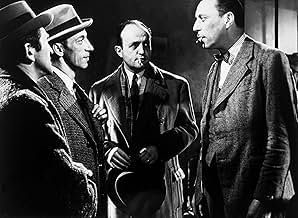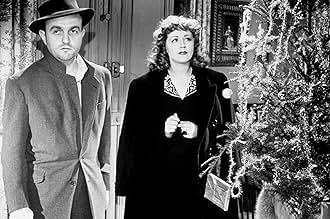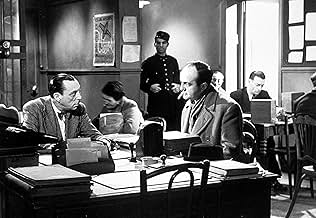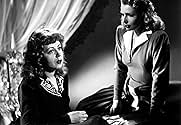AVALIAÇÃO DA IMDb
7,7/10
6,7 mil
SUA AVALIAÇÃO
Um marido ciumento pretende matar o homem que sua esposa está encontrando para negócios, mas chega e descobre que a ação já está feita.Um marido ciumento pretende matar o homem que sua esposa está encontrando para negócios, mas chega e descobre que a ação já está feita.Um marido ciumento pretende matar o homem que sua esposa está encontrando para negócios, mas chega e descobre que a ação já está feita.
- Direção
- Roteiristas
- Artistas
- Prêmios
- 2 vitórias e 1 indicação no total
Henri Arius
- Léopardi
- (as Arius)
Charles Blavette
- Le gendarme Poitevin
- (as Blavette)
René Blancard
- Le commissaire principal de la P.J.
- (as R. Blancard)
Robert Dalban
- Paulo
- (as R. Dalban)
Jean Daurand
- L'inspecteur Picard
- (as J. Daurand)
Jean Dunot
- Nitram
- (as J. Dunot)
Jacques Grétillat
- Auguste
- (as J. Grétillat)
Gilberte Géniat
- Mme Beauvoir
- (as G. Géniat)
Gabriel Gobin
- Le patron du bistrot
- (as G. Gobin)
François Joux
- L' officier de police Fayard
- (as F. Joux)
Avaliações em destaque
The Director loves the actress and it shows. The actress inhabits the character, whom we love at first sight and sound. The character loves her jealous unprepossessing husband and he loves her. His childhood friend secretly loves his wife and the fact that his friend is a beautiful woman makes the love tragic and ironic. His wife is jealous of his childhood friend and thinks her attentions are out of secret love for her husband.
Then there is a murder and the investigating police lieutenant, who loves only his bi-racial son, and resents being taken from his company by the above characters, who have had some unpleasant contact with the deceased and are all lying to one degree or another, unravels the mystery with some of the most precise and authentic procedural detail ever captured on film.
And then there are the atmospherics of a post-war Paris, where coal is in short supply, music is filled with erotic longing and wistful memory, and innocence has long ago been washed away by the rain.
All of this in a milieu of magicians whose tricks don't always work, dogs who walk on their hind feet and express music criticism, hungry news reporters and exhausted cops.
And then there are many of the finest actors of their generation who have been through some very bad years directed by, to come full circle, a man who is in love with his lead actress and who, with full justification, was a respected friend of Picasso.
I've seen this film often and I love all of them and it.
Then there is a murder and the investigating police lieutenant, who loves only his bi-racial son, and resents being taken from his company by the above characters, who have had some unpleasant contact with the deceased and are all lying to one degree or another, unravels the mystery with some of the most precise and authentic procedural detail ever captured on film.
And then there are the atmospherics of a post-war Paris, where coal is in short supply, music is filled with erotic longing and wistful memory, and innocence has long ago been washed away by the rain.
All of this in a milieu of magicians whose tricks don't always work, dogs who walk on their hind feet and express music criticism, hungry news reporters and exhausted cops.
And then there are many of the finest actors of their generation who have been through some very bad years directed by, to come full circle, a man who is in love with his lead actress and who, with full justification, was a respected friend of Picasso.
I've seen this film often and I love all of them and it.
H.G. Cluozot had difficulties working in France after he had made "Le Corbeau" in 1943 which was produced by the German company and later judged by French as a piece of anti-French propaganda. Louis Jouvet, an admirer of Clouzot's work, invited him to direct a thriller "Quai des Orfevres" where he played an ambiguous police inspector investigating a murder that happened in Paris Music Hall. Without each other knowledge, the seductive cabaret singer Jenny Lamoure (Suzy Delair) and her jealous piano-accompanist husband Maurice who is madly in love with her (Bertrand Blier, father of director Bertrand Blier) trying to cover up (without each other's knowledge) what they believe to be their involvement in the murder? Enters tenacious policeman (Louis Jouvet) who is determined to discover the truth. Jouvet practically stole the movie with wonderfully cynic and sentimental in the same time performance. "His character, his eagle-like profile and his unique way of speaking made him unforgettable." "Quai des Orfevres", witty and atmospheric observation of human weaknesses was a great comeback of H.G. Cluozot, the fine director, "French Hitchcock".
Henri-Georges Clouzot's "Quai des Orfevres" (1947) stars Suzy Delair, Bernard Blier, Louis Jouvet, and Charles Dullin. The story takes place in post-war Paris, where an accompanist, Maurice Martineau (Blier) lives with his singer wife, Marguerite, better known as Jenny Lamour (Suzy Delair). An important man, Georges Brignon (Dullin) promises Jenny work, and because she's ambitious, she flirts with him. Maurice is an extremely jealous man, so he finds Brignon in a restaurant and threatens him.
Later on, Jenny tells Maurice she is visiting her grandmother, who lives in another town. This gives Maurice a good opportunity to bump off Brignon, especially when he finds the man's address on a piece of paper in the kitchen and realizes Jenny was lying. But when he gets to Brignon's house, Brignon is already dead.
Inspector Antoine (Juvet) is assigned to the case, and it doesn't take him long to realize that some alibis aren't very secure.
Wonderful film, with the excellent Juvet outstanding as Inspector Antoine, and an excellent performance by Simone Renant as a lesbian photographer, Dora, in love with Jenny. Delair, who was involved with Clouzot, is good as a lower-class woman who loves her husband but wants to get ahead in show business as well.
This is Clouzot at his best, with a witty script with some plot twists and a true Parisian atmosphere.
Later on, Jenny tells Maurice she is visiting her grandmother, who lives in another town. This gives Maurice a good opportunity to bump off Brignon, especially when he finds the man's address on a piece of paper in the kitchen and realizes Jenny was lying. But when he gets to Brignon's house, Brignon is already dead.
Inspector Antoine (Juvet) is assigned to the case, and it doesn't take him long to realize that some alibis aren't very secure.
Wonderful film, with the excellent Juvet outstanding as Inspector Antoine, and an excellent performance by Simone Renant as a lesbian photographer, Dora, in love with Jenny. Delair, who was involved with Clouzot, is good as a lower-class woman who loves her husband but wants to get ahead in show business as well.
This is Clouzot at his best, with a witty script with some plot twists and a true Parisian atmosphere.
A nice, humorous mix of music hall (in the first third mostly) and police procedural mystery as the various suspects' stories start to collapse. The final exposure of the murder may come as a surprise if you don't watch closely. A gritty look at Paris of the time. You can ignore the final scene (the Hollywood ending). Louis Jouvet is best as the police inspector who seems to be just passing through, but is really on top of things.
It takes a while for the scene to set, a subtle intriguing build up, just as you'd expect, but where is it going, this to-ing and fro-ing, as the alibis and excuses unwind and reset? To somewhere quite unexpected is the answer.
Você sabia?
- CuriosidadesHenri-Georges Clouzot wrote almost two-thirds of the film only having read the novel years before, recalling it from memory, since it was out of print by the time he started the screenplay. When the novelist Stanislas-André Steeman saw the film, he was furious about the differences between the novel and the film.
- Erros de gravaçãoWhen Antoine is repeating Maurice's deposition to the typist, he says that the confrontation between Maurice and Brignon at the restaurant took place on Wednesday, December 2, 1946. In 1946, December 2 fell on a Monday.
- Citações
L'inspecteur adjoint Antoine: I have to admit, I've taken a liking to you, Miss Dora Monier.
Dora Monier: Me?
L'inspecteur adjoint Antoine: Because I have to say, you're just my type. When it comes to women, we'll never have a chance.
- ConexõesEdited into Histoire(s) du cinéma: La monnaie de l'absolu (1999)
Principais escolhas
Faça login para avaliar e ver a lista de recomendações personalizadas
- How long is Jenny Lamour?Fornecido pela Alexa
Detalhes
- Data de lançamento
- País de origem
- Central de atendimento oficial
- Idioma
- Também conhecido como
- Jenny Lamour
- Locações de filme
- Paris, França(Exterior)
- Empresa de produção
- Consulte mais créditos da empresa na IMDbPro
Bilheteria
- Faturamento bruto nos EUA e Canadá
- US$ 180.974
- Fim de semana de estreia nos EUA e Canadá
- US$ 9.632
- 27 de out. de 2002
- Faturamento bruto mundial
- US$ 181.041
- Tempo de duração
- 1 h 46 min(106 min)
- Cor
- Proporção
- 1.37 : 1
Contribua para esta página
Sugerir uma alteração ou adicionar conteúdo ausente

![Assistir a Bande-annonce [OV]](https://m.media-amazon.com/images/M/MV5BMmI1MGQ3ZWItMWI3Yi00M2RhLTkwMzEtODUyZWE5NmVhZGRlXkEyXkFqcGdeQXRyYW5zY29kZS13b3JrZmxvdw@@._V1_QL75_UX500_CR0)
